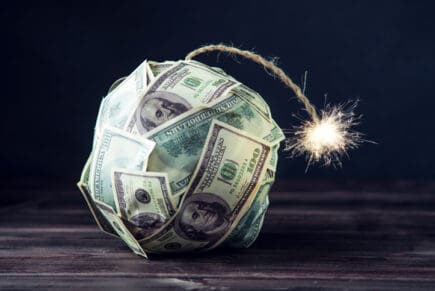 Three weeks before the election, I am in a state of inner turmoil and foreboding. Me, the optimist for whom the glass is always mostly full. (But I have heard that an optimist is a person who just does not understand the situation!) If ever I have bobbed in a sea of greater uncertainty and potential future upheaval, it was the late 1960’s and early 70’s when I was too young to know any better.
Three weeks before the election, I am in a state of inner turmoil and foreboding. Me, the optimist for whom the glass is always mostly full. (But I have heard that an optimist is a person who just does not understand the situation!) If ever I have bobbed in a sea of greater uncertainty and potential future upheaval, it was the late 1960’s and early 70’s when I was too young to know any better.
What is the situation? First, our economic situation. Even before our lockdown and regardless of November 3 winners, we have run up a national debt of $27Trillion, an amount higher than the value of all goods and services we produce each year. Before the past decade, this had only happened to finance the Civil War and World War II expenses.
A strong consensus of economists hold that our level of debt is not a major problem. They compare it to a family buying a home for three times its annual income. As long as cash flow continues, the mortgage payments can be made and the family enjoys the home.
My issue? We are not financing a home or anything like it. As a government, we are financing dinners out every night and services with no lasting substance. We have no emergency fund for unexpected events such as the Virus. Our cash flow is merely the ability of the Federal Reserve Bank and Treasury to push a digital button and print more $Trillions.
When I was younger and accumulated too much debt levels personally, my banker cut me off. I had to cut back on discretionary spending and pay down the debt. We have had no national appetite for controlling our expenses for at least 50 years or more. A cut is now defined as next year’s spending being not quite so much of an increase.
Our primary debt culprit was the reactionary solution to the so-called Great Recession. We went from 62 percent of income in 2007 to 99 percent in 2012. In my opinion, the Zero Interest Rate and related programs were wrong headed from the beginning. They produced the slowest recovery of all time.
My criticism is of the Fed and the army of computer-headed economics Ph.D’s now in charge. During these years, the level of inequality now supposedly causing riots ramped up. The rich did not need loans, but could borrow at ridiculously low rates and grow richer. Small businesses and middle class folks needed the money, but could not borrow. And for over a decade, you savers have now been penalized by interest rates even less than inflation after tax.
President Obama just went with the flow of contemporary dogma. When Obama left office, the debt equaled 104 percent of GDP. The genius Ph.D’s can only say, Think how bad it would have been if we had not saved the world?
Then enters President Trump, lately a Republican. He was a great friend of Democrats until 2016 and the fateful escalator ride. The Trump tax cuts of 2017 put nearly everyone back to work who is willing and able, but caused only an incremental rise of 2 percent higher debt.
He is a real estate developer who loves low interest rates and borrowed money. He is a Democrat (or Republican in name only) when it comes to spending. If we can get back to work as a nation, we can figure out how to stop the bleeding. A few trillion of taxes raised will kill the golden goose.
No matter who is elected President, we have and will continue to have a spending problem. The words of President Kennedy that we should consider what we can do for the country sound quite quaint now. Every one of us have our hands out for higher spending for healthcare, education, Social Security payments.
It might seem as If (but I would say When) interest rates rise, government spending on national debt interest will be crowding out spending on our dinners out every night. Spoiled Americans will not like that. If inflation kicks in with stagnant economic growth, social unrest could become our dominant fact of life. Desperate people demand radical promises. Read some history of the 1930’s in the US and Germany.
The best thing I know is that most things we worry about do not come to pass. May this fear die on the vine as well. Next week I will address what you might choose to do concerning your investments with regard to the election results.
